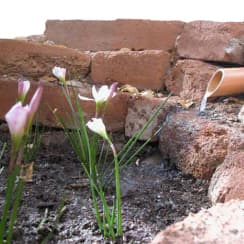AMWUA Blog
BY: Kathleen FerrisWant To Reuse Laundry Water In Your Yard? Tempe Is Ready To Help

Each year an average family in the City of Tempe uses about 30,000 gallons of drinking water to wash clothes. Tempe is the first city in the Greater Phoenix Metropolitan Area to help homeowners pay to reroute their laundry water and reuse it to irrigate trees, lawns, and plants.
Water from your washing machine and your shower or bathtub is called graywater (also called gray water greywater, if you're going to search online). It is the only wastewater draining from your house that the state allows to be diverted and reused to water landscaping. Graywater policies vary from state to state. Arizona’s rules make it easy for homeowners to reuse their graywater, and they are considered a model for other states.
Laundry and shower water is called graywater to distinguish it from blackwater. Blackwater is a term used to describe water draining from your kitchen sink, dishwasher and toilet. The state prohibits homeowners from reusing it. Untreated blackwater is contaminated with organic matter and can contain viruses and pathogens, which creates a health hazard if spread around your yard.
Valley cities treat both blackwater and graywater from homes and businesses to high standards on an industrial scale. This highly treated wastewater is reused to cool power plants and for irrigation, fishing ponds and wetlands, and groundwater recharge. In the Phoenix area, nearly 100 percent of water discharged into municipal sewer systems is reclaimed and put to beneficial uses.
Saving graywater from a shower or tub isn’t practical in existing Arizona homes. Most plumbing is under the foundation slab making it an expensive retrofit. A better idea is to consider a graywater reuse system before you build a home.
Reusing laundry water is easier and less expensive. Tempe will pay you half the cost of constructing a graywater irrigation system, up to $200. Construction usually involves drilling a hole through the wall near your washing machine, inserting a sleeve to create a seal around the hole, and threading a second and longer hose from your clothes washer through the hole so that it empties outside.
If you decide to store the graywater in a plastic barrel, the water needs to be used quickly, particularly in the summer. Standing water attracts mosquitoes and rodents, so it must be covered with at least a screen. It can also get smelly and slimy within days. It’s often less work to construct a free-flowing system that will allow the graywater to directly irrigate a couple trees or your lawn.
Of course, this home improvement project comes with some precautions. Here are a few.
- Don’t plan to divert your laundry water if you wash diapers or clothes spotted with industrial oils or grease. It is as unsafe as blackwater.
- Don’t plan to use graywater on your vegetable garden. The state prohibits graywater irrigation of food crops, except citrus and nut trees.
- Most laundry products found in graywater will not harm most plants. Some laundry products are better than others. The University of Arizona and Tucson Water has information (pdf) about what to look for in your detergent.
- Graywater is fine for watering lawns and salt-tolerant plants, such as oleanders, palm trees, ornamental shrubs and native plants. Avoid fussy plants that are not drought tolerant, such as hibiscus.
Tempe's goal is to encourage 25 homeowners to take advantage of its Graywater Harvesting Rebate this year. That would save about 750,000 gallons of drinking water that would be used to water landscaping.
Need a little guidance? You can get hands-on instructions about constructing a graywater system at a May 16 Tempe workshop .
There is more information about graywater reuse and the rebate on the Tempe Water Conservation website. The Water Conservation Alliance of Southern Arizona also has a useful fact sheet about using graywater for irrigation. The Arizona Department of Environmental Quality has a pamphlet that describes how graywater can be used safely.
For 45 years, Arizona Municipal Water Users Association has worked to protect our member cities’ ability to provide assured, safe and sustainable water supplies to their communities. For more water information visit www.amwua.org.
Photo: Arizona Department of Environmental Quality
